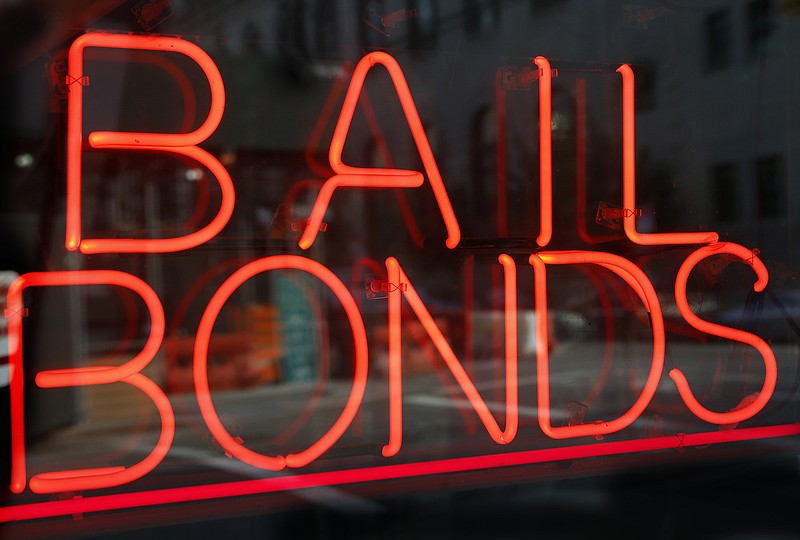More Info
For more information, visit thebronxfreedomfund.org.
Let's say you're arrested for a misdemeanor crime. Something small and nonviolent, like driving without a license. Shoplifting. Possession of a little marijuana.
And let's say your savings account is nearly dry. (Some 60 percent of Americans don't have $500 in their savings, according to a Bankrate report earlier this year.)
The judge sets bail at $500.
But you can't afford to pay it.
So you remain in jail where - remember - you've only been accused of a crime. In the eyes of the law, you're innocent.
Your poverty has become your crime. What was originally meant to ensure and incentivize your return to court - your bail money - has now become your punishment.
So you stay in jail, unable to afford your freedom.
Which means you can't work.
So you may lose your job.
Or you can't sign in at the homeless shelter.
So you may lose your bed.
Or you can't make it back to class - yes, this happens to teenagers.
So you may fail.
Or you can't get home.
So you may lose your family or custody of your children.
All because you don't have enough money.
"All across this country, people are being locked in jail cells because they can't pull together a couple hundred dollars," said Ezra Ritchin, who heads the Bronx Freedom Fund in New York City.
According to Ritchin:
» Only one in 10 New Yorkers are able to pay bail at their arraignment.
» Ninety percent of people who stay in jail on bail - unable to buy their release - will plead guilty, even though they did not commit the crime.
Why?
Because after spending days in jail for a crime you did not commit, a prosecutor's offer - plead guilty and we'll release you for time served - lets you go home, back to work, to your family.
This is the cruelest of ironies.
"It is a world in which if you say you're innocent, you go to jail," Ritchin said. "If you say you're guilty, you go home."
Ritchin and the Bronx Freedom Fund help interrupt all of this.
"We pay bail for someone who can't afford it themselves in order to make sure they can get home," Ritchin said.
Bailing out 80 to 100 New Yorkers per month, the Freedom Fund relies entirely on private donations; the fund receives all its money back 94 percent of the time - when the accused returns to court - and then recycles it forward to the next New Yorker needing bail.
"It gets people back to their families, communities, housing, jobs to prevent the massive destabilization that can happen from even short jail stays," he said.
Reducing jail population.
Reducing court backlog.
Reducing broken families, trauma and unemployment.
"We're bailing out a lot of young people. A lot of 16 year-old kids who have gone straight from jail back to high school classes," he said. "We've paid bail for multiple people who've gone from jail straight back to chemotherapy treatments."
Can we start a Chattanooga Freedom Fund?
A recent report gave Tennessee - including Chattanooga - a failing grade when it comes to ensuring pretrial justice and fairness. The "State of Pretrial Justice Report," written by the Pretrial Justice Institute, said some 66 percent of all Americans in jail are awaiting trial.
Here in Hamilton County, roughly half of all jail inmates are awaiting trial. Our state's pretrial population more than doubled between 1978 and 2013, according to the Prison Policy Initiative.
Sheriff Jim Hammond has declared his intentions to reduce this cash-bond warped system, which is a good beginning.
But the entire cash-bond system should be eliminated entirely.
It creates two systems in Hamilton County.
View other columns by David Cook
One for the wealthy.
One for the poor, who are often Chattanoogans of color. In Tennessee, blacks are 17 percent of our state's population, yet 44 percent of our prison population. (Again, Prison Policy Initiative.)
The criminal justice system often seems more morally criminal than just.
"It has morphed into another manifestation of our racist and classist criminal legal system," Ritchin said.
At the Bronx Freedom Fund, they have a saying: "A body incarcerated stays incarcerated. A body free stays free."
Isn't freedom what we want for all Chattanoogans?
Could we start such a fund here?
David Cook writes a Sunday column and can be reached at dcook@timesfreepress.com or 423-757-6329. Follow him on Facebook at DavidCookTFP.

